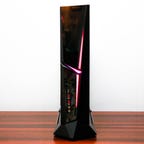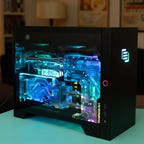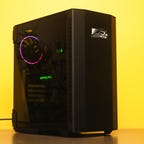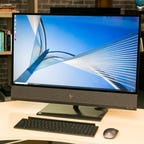Best Gaming PC for 2024
From cheapie computers that can just about handle HD to 4K PC monsters, we'll help you navigate the terrain.
Our Picks


Gone are times when you needed to spend thousands of bucks to get into PC gaming. It isn't as hard to get into as it used to be, thanks in large part to being able to buy great prebuilt gaming PCs. They are already built for people to start gaming on, while also being easily upgradeable for the future when parts start to age and new hardware releases. There are so many options available as well, making it easy to pinpoint the exact specs for your budget and power needs. If you're an indie gaming connoisseur, a hardcore multiplayer fan or someone who wants to max out all the settings, there's a gaming PC that's perfect for you.
But even with all of these options, gamers are among the hardest segments to recommend PCs for, at least if you're in the 99% for whom price matters. There are just too many choices, especially if those looking to forgo a prebuilt PC and embark on a gaming PC build of their own.
Further, your buying decisions have likely been influenced by the ongoing effects of the pandemic, whether because you're anticipating working from home for the long haul or because your budget has shrunk substantially. If you're unsure, you may want to hold off for a little while before jumping in. In the meantime, you could fill the gap with a cloud-gaming service (such as Stadia or GeForce Now) or a desktop-as-a-service like Shadow -- provided your network connection is up to it.
I'll admit, I'm waving my hands a bit here: Some of these aren't recommendations for a specific gaming computer, more for ballpark configurations and honorable mentions of the manufacturers or system builders with a specific case design that you should consider in various scenarios if you're a PC gamer. (And when it's time to sweat the details, User Benchmark is a great site for getting a sense of key features and performance deltas between different components.)
As far as PC gaming goes, all power players ponder how to build a gaming PC at some point or another. As they go through the gaming PC build, they also wonder whether the resulting gaming experience is worth it. Doing your own PC build is a great option if choices and DIY don't scare you -- it's sometimes the only way to get the best gaming PC configuration for your needs -- or if you think PC building will be fun. But it generally doesn't work out to be a way to save money over an identical prebuilt gaming PC, or if you don't know what a motherboard is and how it works.
It may be cheaper to do your own PC build than getting a premium custom PC model from a company like Origin PC, Falcon Northwest, Digital Storm, Maingear and the like, but the flip side is that it's nice to have someone else do the overclocking iterations, stability testing and burn-in runs. There are few things more frustrating than gearing up and sitting down to play the latest AAA only to have it crap out during the opening cutscene with only yourself to blame.
The other high-level decision you may confront is whether to go with a gaming desktop or laptop, especially since 17-inch gaming laptops with desktop-class CPUs and GPUs like the Alienware Area-51m, Acer Predator Helios 700 and Gigabyte Aorus 17X deliver desktop-level performance with convenience similar to an all-in-one. An all-in-one with a really fast, gaming-optimized display. Though big laptops like these usually support upgrades, it's usually not as cheap or easy to do it as it is with even the least expensive gaming desktop.
Things to consider for your Gaming PC
Choosing the best gaming desktop for your gaming experience is all about trade-offs. Every game uses system resources -- processor (aka CPU), graphics processor (GPU), memory (RAM), storage -- differently, and often horribly inefficiently. You can't even count on resource usage to be consistent across a specific game genre, such as first-person shooter, platformer or simulation, because optimization levels can vary wildly. Gaming (and content-creation) PCs are the angry toddlers of consumer electronics: They're loud, willful and require constant supervision. And just when you think they're under control, they veer off into crazy-town.
As you configure your gaming rig, here are some considerations to keep in mind:
- A "gaming system" is effectively defined by its use of a discrete graphics processor, which, for the moment at least, means AMD Radeon or Nvidia GeForce graphics. So it (should) go without saying that you should avoid dirt-cheap configurations with integrated GPUs (aka iGPUs). However, if the best gaming PC you can afford right now is an iGPU-based system, make sure it either has sufficient slot space and power supply for a GPU upgrade. Unfortunately, Thunderbolt 3 ports on desktops are still pretty scarce -- newer Intel 11th-gen gaming desktop PC chips with support for Thunderbolt 4 have been announced as well.
- For whichever CPU you buy, get the latest generation available. It's usually indicated by the first digit of the CPU model name. In this case, that means the 10th generation for Intel Core i (such as i7-10700K) and third generation for AMD Ryzen (e.g., Ryzen 7 5800X). Even if it's not remarkably faster than the previous generation, they usually gain efficiencies gen over gen that improve performance in small ways without a big price premium. In the case of the latest generation of Intel processors, they gain back the hyperthreading Intel had dropped with the ninth-gen parts and incorporate better heat dissipation (to sustain higher speeds longer). If you want to save money, you can frequently go down a class, for instance, instead of getting an i7 get an i5, as long as you're not dropping below four cores.
- Before you start configuring, think about what your most frequently played games are and check out forums to figure out whether their performance depends on a gazillion-core CPU or eats GPU cycles. For example, can they take noticeable advantage of 4K resolution, or do they look the same as in HD, just with an unplayably large drop in frame rate? Do you gain a significant increase in world complexity with a faster, higher-core-count CPU than you lose in frame rate by going down a class in GPU (usually in sims or RPGs).
- On the flip side, don't get hung up too much on frame rates past a certain point: If you look at the numbers across a variety of benchmarks and game types, you do get a sense of the relative power of one configuration over another. But your goal is smooth gameplay -- depending upon the game and your monitor's capabilities, that can vary from a minimum of 60fps to 240fps or more -- at a quality level that pleases you and that fits within your budget.
- Dual GPUs still aren't worth it. Falcon Northwest and Origin PC systems I've tested with dual GPUs have delivered over 200fps in 4K running Doom because that game takes advantage of them. But I'd be dying just as spectacularly at 120fps in 1440p (2,560x1,440) and would gladly have exchanged some of those frames for more stability in Adobe's applications.
- Intel versus AMD CPUs: Unless you're buying a custom build or doing the PC build yourself, you really don't get to choose comparable configurations to mix and match. The manufacturers tend to choose the configurations based on what they think will be popular at given price levels. Pick your preferred graphics card and then see what CPU options are on offer within your budget. AMDs tend to have slower clock speeds -- they have higher base clocks and lower boost clocks -- but better multicore performance for the same money. If your favorite games are old, they probably don't take advantage of more than four cores (if that), and will likely give you the power you need from Intel's fast individual cores. However, AMD's most recent processors have significantly closed the single-core-performance gap with Intel and almost all support overclocking (only Intel's K series do).
- Figure out what kind of tech support client you are. Do you waste hours banging away at a problem, scouring the web for help, rather than contacting the company -- guilty! -- or do you want humans available to you to quickly help smooth over the rough patches? Big manufacturers usually have active user forums scattered around the web for user-to-user help and knowledge-bases with some troubleshooting help; boutique builders, not so much, because you're paying a premium for more personal human help and because the configurations are highly customized.
- For turnkey-ish streaming, you should consider a Corsair or Origin PC. Corsair owns the latter as well as Elgato and equips almost all the systems with Elgato cards.
- If you plan on upgrading the graphics card in the future, think about the power supply, the space in the case and the cooling system. A lot of the lower-end systems come with 500-watt power supply units when future high-end cards usually require a lot more. And smaller cases frequently have cramped quarters that may not be able to fit a next-gen, longer card and liquid cooling systems frequently have to be replaced (or at the very least drained) in order to install a new card.
The Best Gaming PCs
The Pro model of the Corsair One I reviewed is oriented toward content creation, but it differs only from the PC gaming models by its processor -- Intel's X series rather than K series -- which also makes the gaming systems cheaper. The Corsair One i164 is the gaming analog of the i200, with an i9-10900K instead of the i9-10940X and costs significantly less ($3,300). The entry model i145 is pretty well-equipped for $2,500, with an i7-9700F and GeForce RTX 2080 Super. The Corsair One models may not eke every bit of performance out of the components, but that's the tradeoff for going with a petite powerhouse. The design is especially great for VR, thanks to HDMI and USB ports in the front.
Best combo of size, speed and gaming flash
Maingear Turbo
Maingear's Apex liquid-cooling system has a stunning, look-at-me-I-game style, plus it keeps high-end components like an AMD Ryzen 5950X and Nvidia GeForce RTX 3080 chilled, quiet and running at top speed for your 4K gaming and heavy-duty simulation gameplay. And though it's not the smallest of the small-form-factor desktops, it's still more compact than a midtower -- just a little larger than two Xbox Series X consoles. The entry price will only get you a fairly staid-looking 1080p system, though; you'll have to spend more to get both the flash and the speed.
Best midtower for customizers
Falcon Northwest Talon
Falcon Northwest's 2020 version of its midtower (38 liter) Talon case, formerly called the "20th Anniversary Edition," is much improved over the older case and because FNW's a custom builder you get a gazillion configuration options and pretty paint jobs. The configuration I tested was fast and stable. It's not cheap, but it should last you a long time.
Best gaming performance in tight spots
MSI MEG Trident X (Update: Out of stock)
The Trident X packs top-flight components into a skinny chassis (only about 5 inches wide) and is surprisingly quiet for all its power. Plus, it looks a little more like a gaming system than the low-key Corsair models. The RTX 20-series models have been discontinued and the RTX 30-series are in preorder, but prices start at about $2,400 with a 10th-gen Core i7, 32GB RAM, an RTX 3070 and a 1TB SSD.
Best all-in-one for gaming
HP Envy 32 All-in-One (Update: Out of stock)
I'm not sure an all-in-one is the best route to go for gaming, partly because the built-in displays are all fixed at 60Hz refresh and they use mobile parts. But for PC gaming where a big (32 inches) 4K HDR screen may make a big impact, like simulations, HP's RTX 20-series-equipped all-in-one can't be beat. The model we tested was the RTX 2060 configuration; prices start at about $1,700 with a GTX 1650.
Performance examples
3DMark Fire Strike Ultra
Shadow of the Tomb Raider gaming test
3DMark Port Royal (RTX)
More gaming recommendations
- Best Gaming Chair for 2024
- The 30 Best iPad Games You Need to Play
- Best Gaming Accessories to Give as Holiday Gifts
- Best Graphics Cards for PC Gamers and Creatives
- The Best Racing Wheels and Pedals for iRacing and Your Budget
- Best Phone for Gaming
- Best Gaming Mouse Under $50 for 2024
- Best Gaming Routers
- Best Gaming Laptop for 2024
- Best Wireless Mouse for 2024
- Best Gaming Keyboard for 2024
- Best Nintendo Switch Games
- Best Drones for 2024
- 8 Great Driving Games for Xbox




